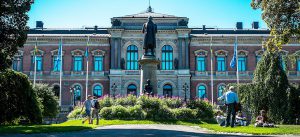What we did in the project
UU conducted two study circles with four sessions each running from October 2014 until April 2014: Group 1 was held with eight participants (five women, three men) from five different departments and with different levels of supervisory experience. Group 2 was held with four participants (three women, one man), all from the department of organism biology. The participants in group 1 signed up for the study circles after an invitation to all PhD supervisors at the Faculty; the participants of group 2 attended the study circle after an invitation sent by the head of the department addressing all supervisors at the department. In Sweden, information on Swedish PhD students´ study experiences is available through a range of local as well as national student surveys; these results, as well as research on gender in academia and on PhD supervision in general, formed the knowledge base for the study circles, which created a space for collegial reflection and learning.
In addition to the study circle, the department of organism biology decided to conduct a workshop on “Effective PhD supervision” (including a gender and diversity perspective) for all supervisors and all PhD students at the department. This two hour workshop was organized in Autumn 2015.
Finally, a workshop on “Equal opportunity aware PhD supervision” was offered in November 2015 as a part of the Faculty´s overall action plan for equal opportunities. Ten students attended the workshop and students´ feedback was used as input to the FESTA guidelines.
What we learned in the project
Since it would be impossible in the context of Uppsala University to make the study circle mandatory for supervisors, one weakness with the study circle concept is that it reached supervisors who already possessed a strong interest in supervision and gender and diversity issues. At the same time, the study circle offered a unique opportunity for participants to reflect together and share experiences. That was highly valued because it is otherwise not really a part of the culture (yet). Moreover, at the department for organism biology, the study circle led to two workshops (one for supervisors, one for students) which was attended by (almost) all supervisors and students; this might be a point of departure for a better supervision culture (including gender aspects) at the department.
Through cooperation with FESTA partners, we have learned that the context for PhD education and supervision is very different in different countries. Moreover, we have realized that our concepts and language are highly influenced by a pedagogical discourse used within the context of educational development in our University. The fact that partners are working in other contexts and use other discourses has implied a variety of perspectives which has enriched our understanding.
Uppsala University
Box 256
751 05 Uppsala
Sweden
Tel. +46 18 471 00 00
Representatives
FESTA coordinator Minna Salminen-Karlsson, associate professor in sociology, researcher at Centre for Gender Research and gender equality specialist at Human Resources Division, Unit for HR Support.
Coordinator Nina Almgren, PhD in history and gender equality specialist at Human Resources Division, Unit for HR Support.
Internal expert Elisabeth Larsson, associate professor in scientific computing, senior lecturer at Department of Information Technology, Division of Scientific Computing.
Team member Ulrike Schnaas, academic developer at Division for Quality Enhancement / Academic Teaching and Learning.
General Information
Number of employees: 6,840
Teachers with PhD degrees: 1,534 full-time equivalents – 41% women
Professors: 559 full-time equivalents – 25% women.
45,354 registered students, equalling 24,730 full-time students
70 programmes for beginners, 60 Master´s programmes, 2,100 freestanding courses
2,522 doctoral students – 45% women.
Turnover: SEK 6.3 billion. 53% of research is funded by external sources.
Three Disciplinary Domains: Arts and Social Sciences, Medicine and Pharmacy, and Science and Technology
Nine faculties
FESTA Project Team situated in Human Resources Division
Representing in FESTA: Science, gender/social studies and management/administration


